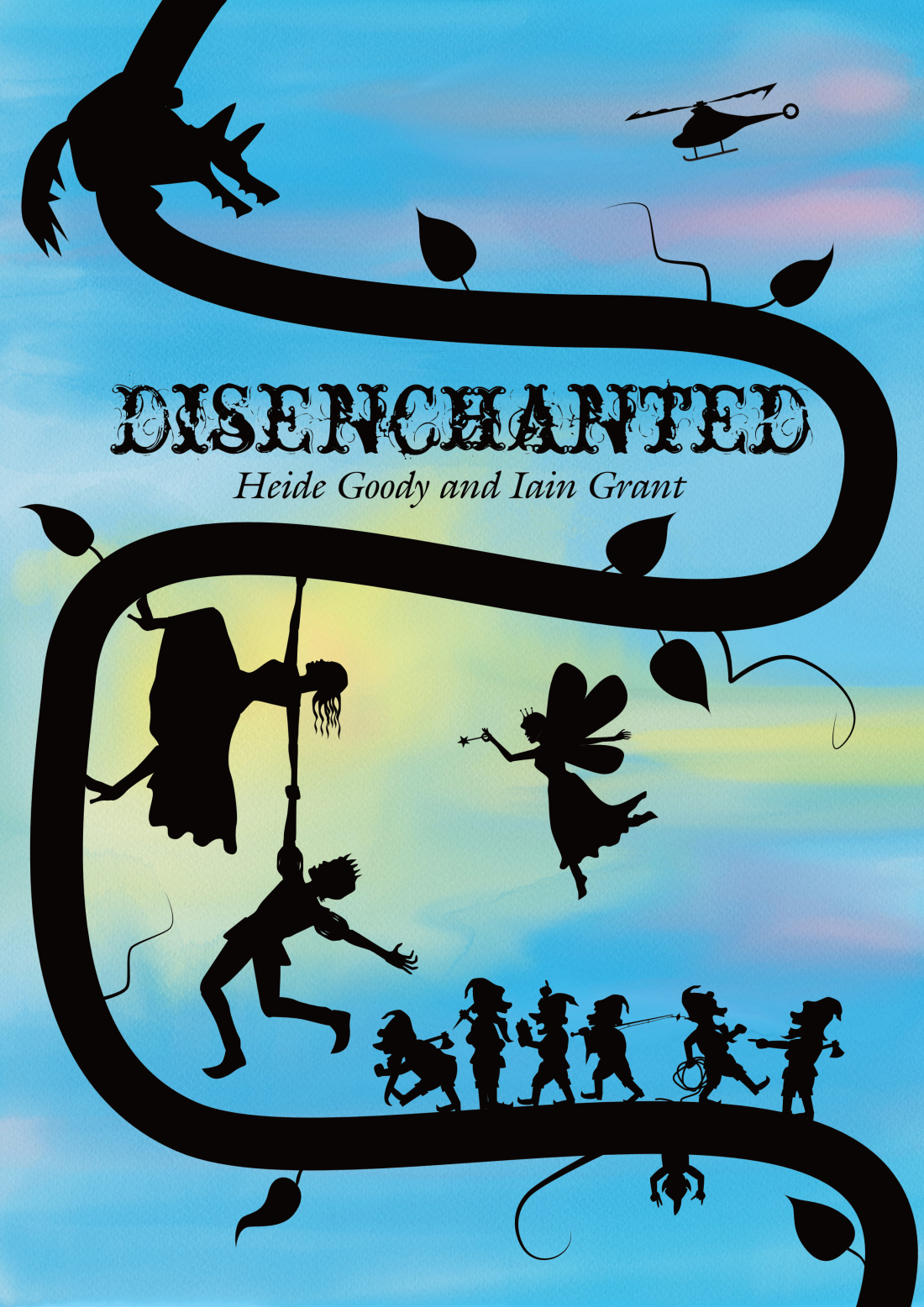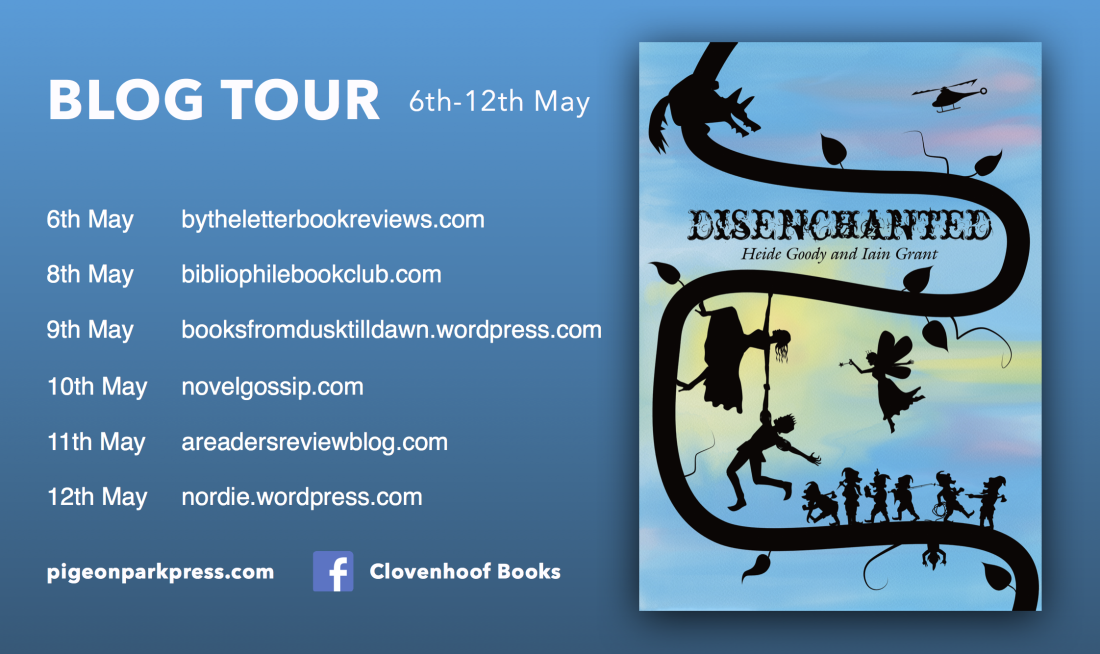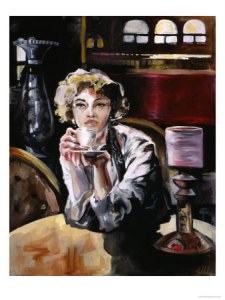Hi everyone,
Today is Ellen’s stop on the blog tour for Disenchanted by Heide Goody and Iain Grant, and she’s sharing her review with you guys along with a story from the authors! First though, here’s all of the bookish information you need to know!
About the book:

I’ve been in need of something fun to read recently, so when I was given the chance to review Disenchanted I was quick to offer my services. I have read and loved the Clovenhoof series and knew that I was guaranteed giggles galore.
Before we get to me actual review, I have to mention the cover which is absolutely beautiful. It reminds me of the Zap lollies I used to get from the ice-cream van as a child; totally lickable!
Now to the story – I was not disappointed in the slightest: snorts/giggles and guffaws aplenty. This twisted fairytale was absolutely on my humour wavelength. At one point I lost the plot over the word shepherd’s pie and it’s still making me laugh to think about it! I loved Ella’s no-nonsense attitude and her refusal to accept the “happy ever after” ending that her intimidating fairy godmother has planned. It is difficult to pick a favourite character as they all had a certain charm but if pressed I’ll go for the talking teapot with potterycide on his mind, Grandma Rose for her tough Yorkshire outlook (I’m Yorkshire born and bred myself tha’ knows) and I’m a little worried that I may have peculiar feelings over a certain Mr Wolf….
An unconditional five stars for this intelligent and hugely entertaining book. I look forward to the next from Heide and Iain!
Short story:
Heide and Iains latest novel, Disenchanted, is out this month. The fairy tale fantasy comedy was written with no small assistance from Dr Epiphany Alexander of Sheffield Universitys Department for Folklore and Oral History. As an insight into the research material used to create Disenchanted, we present one of Dr Alexanders letters to the author duo. My Dear Friends, I came home from my trip to Leeds to find a copy of your book, Disenchanted, on my doormat. The artwork is delightful and the jacket text suggests a very, um, eventful narrative. I m sure I will love it and will no doubt be able to give you a critical opinion when we meet a week on Saturday. It is my habit to read in the rear study perhaps with a round of cucumber sandwic hes and a pot of tea. Pak Choi, my loyal retainer, brews a superior dandelion tea but is, sadly, no help with the sandwiches (its the cutlery; his folk cannot abide the cold touch of iron). H owever, I realise now that such niceties as tea and reading will have to wait for the time being as I must be off again tomorrow. [Pak Choi has drawn a superior picture of my usual tea] As I say, I came home to Sheffield to find your book on my doormat but, in all honesty, I was more distracted by the vellum parchment I had brought home with me. Its gruesome origins notwithstanding, it was a peculiar piece, covered as it was with writing in a precise hand but of an ink that had faded to almost total illegibility. There was little of it I could make out but there was a clear mention of Langs Black Fairy Book and that alone was enough to send me all aquiver. I am sure as amateur students of fairy tales, you are aware of the Victorian scholars incomparable work in collecting and categorising fairy tales. His twelve coloured books of fairy tales are well- known and widely published but I had only ever heard scandalous and dark rumours of this thirteenth volume. The only other word I could truly make out in the text was domunculus which, whilst seeming tantalisingly familiar, was unknown to me. To clear my head and perhaps inspire thought, Pak Choi and I took a walk. My house backs onto Wardsend Cemetery, home to the final resting place of a Lakota Sioux who died in the city while performing with Buffalo Bills Wild West Show. There is a local story about how the ghost of the Sioux flagged down a train and thereby prevented a collision with a derailed coal t ruck but, delicious though it is, my research into the matter traces the story back to no earlier than 1973 and an argument between two drunken Sheffield Wednesday fans in the Masons Arms. This is how fairy tales are born. We cut through the cemetery, past the Trebor sweet factory and down to the banks of the River Don. There is a veritable forest of fig trees growing along the Don towards the east of the city. The trees are hardly native. As best anyone can tell, their roots – not their literal roots, dear friends – are the fig roll factories that dotted the area. However, used to a Mediterranean climate, the original fig trees were only able to grow because of the hot water being continually pumped into the Don by the riverside steel works. Pak Choi and I did not make it as far as the fig trees but when we do, I always try to spot any flowers on the trees, just like Dunzfel in the old Eastern European tale. The Six Tasks of Dunzfel appears in Langs Lilac Fairy Book. It is one of a broad range of fairy tales in which the poor protagonist – in this case, a young man who wished to marry the princess – is forced to undertake a number of seemingly impossible tasks. In Dunzfels case, the tasks are to fill a barrel of water from a well using only a sieve, to state the number of hairs on the kings head, to hold his breath from one year to the next, to collect a posy of a thousand fig flowers, to weave a carpet from spider s silk, and to summon all the wolves in the world. Dunzfel achieves most of these by cunning (he plucks a hair from the kings head and tells him he has one less hair than before and holds his breath just before midnight on New Years Eve) and through the assistance of animal friends (who line his sieve with moss and find a thousand of the elusive fig flowers fo r him). The request for a rug of spider silk is answered with sarcasm (Dunzfel presents the king with a twig and says he will weave the rug on a loom fashioned by the king from the twig). The king waives the final task, seeing that Dunzfel has completed the other five and not wishing to have all the wolv es in the world turn up on his doorstep. We returned home in good spirits – Pak Choi once again regaled me with the tale of why he had set fire to the Trebor factory in the early seventies (it is said that the ferocious fire that consumed the mountains of sugar in the factory created a burned toffee smell across the city for weeks) – only to find that our house had been burgled! The downstairs rooms were in some disarray. Furniture had been overturned, drawers ransacked and items thrown from shelves. Anything and every thing of value or interest had been taken. You will be pleased to hear that my copy of your book was untouched. But, most alarming of all, the vellum parchment I had placed at the very back of the desk drawer had been found and taken. Pak Choi thought this most suspicious. I was suddenly reminded of the French tale of Rum Baba Boy. Perhaps the recollection was caused by the sight of the destruction of my home, coupled with Pak Chois talk of sweet factories . Rum Baba Boy is a curious variant of the gingerbread man story, except in this instance, the young protagonist is not made from gingerbread but alcohol-soaked pastry. The poor, drunken creature spends nearly the entire narrative running through the city, crying lack-a-day, lack-a-day, who will find a cure for my malady? Rum Baba Boy runs through the houses of Paris, looking for a cure for his drunken madness. He ransacks the home of a baker, a doctor, a lawyer, a priest and a merchant. Only when he reaches the poorest part of the city does a stray terrier offer him a cure for all his ills and gobbles him up. Unlike the gingerbread man, Rum Baba Boy does gain some form of revenge from beyond the grave; the terrier, intoxicated by the rum-soaked cake, falls i n the Seine and drowns. [here is a picture of a drunk terrier falling into the Seine] The human mind is a curious thing; the recalling of that story reminded me where I had encountered the word domunculus before. I gave a sudden shout of Bunty Jangles! which, I can assure you, is not something I shout out often. I followed it with a shout of I must go to Uttoxeter! which is something I shout out even less. While Pak Choi packed a small valise for me, I telephoned for a taxi-cab. T he young man who came to the door had a bit of a terrier look about him and his not insi gnificant eyebrows put me in mind of the hotel-boy I met in Leeds. But we shouldn t judge people by their appearances, should we? I am taking my copy of your book with me and shall read it as I go on this little adventure of my own. I will write again, Yours, Dr E. Alexander Dr Epiphany Alexanders latest book, Get Your Head Out Of The Clouds: Why Jack Shouldnt Have Climbed That Beanstalk is currently available from Sheffield Academic Press. Heide Goody and Iain Grants novel, Disenchanted, is available now from Amazon.Make sure to follow the blog tour:

Share this:






